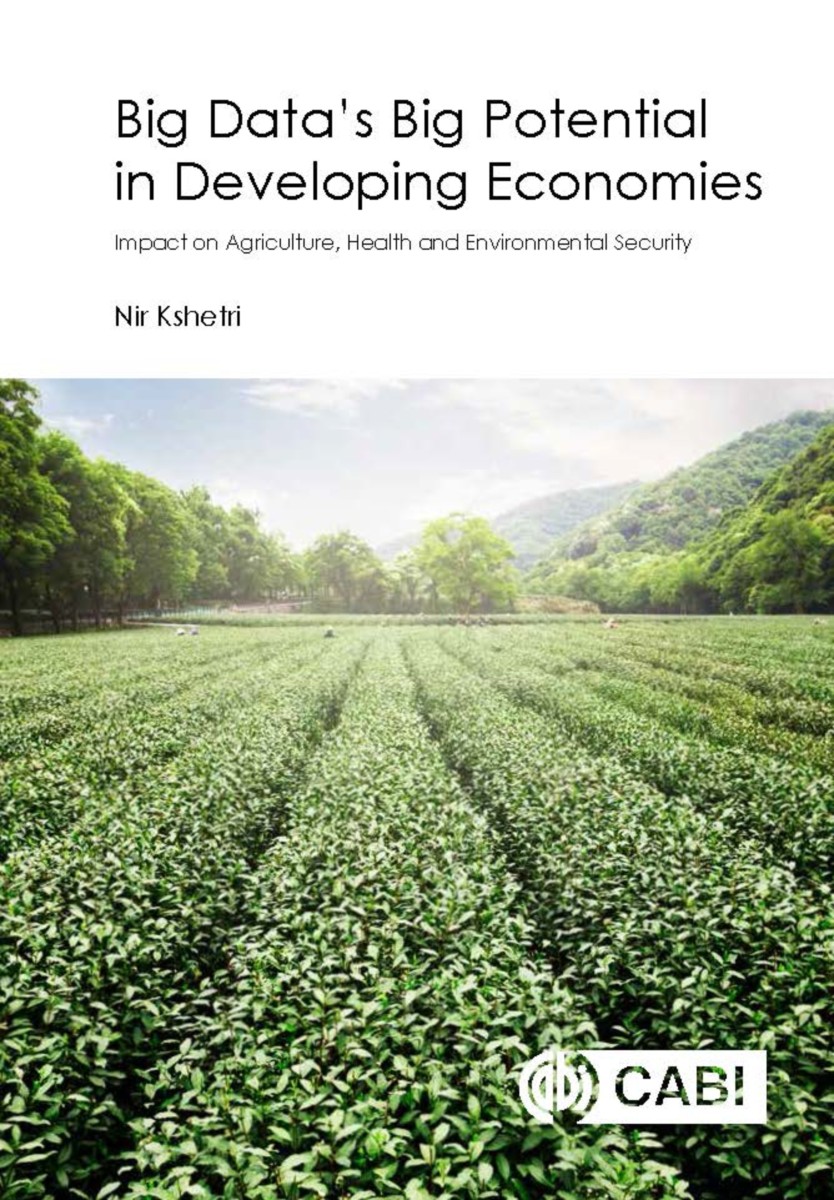Big Data’s Big Potential in Developing Economies
Impact on Agriculture, Health and Environmental Security
- Publisher
CABI - Published
19th November 2016 - ISBN 9781780648682
- Language English
- Pages 232 pp.
- Size 6.75" x 9.5"
- Images tables
Big data involves the use of sophisticated analytics to make decisions based on large-scale data inputs. It is set to transform agriculture, environmental protection and healthcare in developing countries. This book critically evaluates the developing big data industry and market in these countries and gives an overview of the determinants, performances and impacts.
The book provides a detailed analysis of technology creation, technology infrastructures and human skills to utilize big data in these countries. It discusses novel applications and business models involving big data to overcome healthcare barriers. The book also offers an analysis of big data’s potential to improve environmental monitoring and protection. It posits that big data is likely to have far-reaching and profound impacts on the agricultural sector.
A key question addressed is also how gains in agricultural productivity associated with big data will benefit smallholder farmers relative to global multinationals in that sector. It also probes big data’s roles in the creation of markets that can improve the welfare of smallholder farmers. The book gives special consideration to big data-led transformation of the financial industry and discusses how the transformation can increase small-holder farmers’ access to finance by changing the way lenders assess creditworthiness of potential borrowers. It also takes a look at data privacy and security issues facing smallholder farmers and reviews differences in such issues in industrialized and developing countries.
The key ideas, concepts and theories presented are explored, illustrated and contrasted through in-depth case studies of developing world-based big data companies and deployment and utilization big data in agriculture, environmental protection and healthcare.
1. Big Data in Developing Countries: Current Status, Opportunities and Challenges
2. Big Data Ecosystem in Developing Countries
3. Big Data in Environmental Protection and Resources Conservation
4. Big Data in Healthcare Delivery and Outcomes
5. Big Data in Agriculture
6. Big Data’s Roles in Increasing Smallholder Farmers’ Access to Finance
7. Data Privacy and Security Issues Facing Smallholder Farmers and Poor
Communities in Developing Countries
8. Lessons Learned, Implications and the Way Forward
Nir Kshetri
Nir Kshetri is Professor at the Bryan School of Business and Economics, The University of North Carolina-Greensboro and a research fellow at Research Institute for Economics & Business Administration, Kobe University, Japan. Nir is the author of four books. His 2014 book Global Entrepreneurship: Environment and Strategy (Routledge) was selected as Outstanding Academic Title by Choice Magazine. He has published eighty-five journal articles and over two dozen book chapters. His cloud- and big data-related articles have been published in Third World Quarterly, Communications of the ACM, IEEE Computer, Telecommunications Policy, IEEE IT Professional, Big Data and Society and others. Nir has given keynote speeches on big data related topics in academic/industry events in Brazil, Colombia, Nepal and Sri Lanka. He has also given lectures or presented papers (over 160) at national/international meetings/conferences in forty five countries. Nir participated as lead discussant at the Peer Review meeting of the UN's Information Economy Report 2013 and 2015. Nir's recent research-related awards include Best Academic Paper Award at the Business and Entrepreneurship in Africa Conference (2013) and best paper award at the 5th International Conference on Information Systems and Economic Intelligence (2012). A 2012 study ranked him #2 in the number of articles published in Journal of International Management. Nir received Emerald Literati Network Award for Excellence in 2013 and 2010. He is a two time winner of the Pacific Telecommunication Council's Jussawalla Research Paper Prize. Nir has been interviewed and/or quoted in over 60 media outlets from a number of countries.


